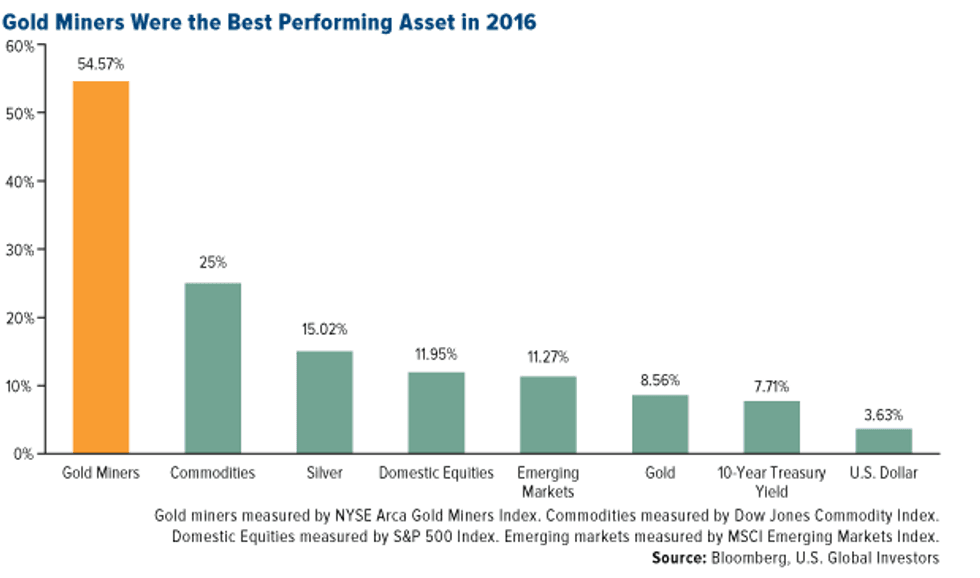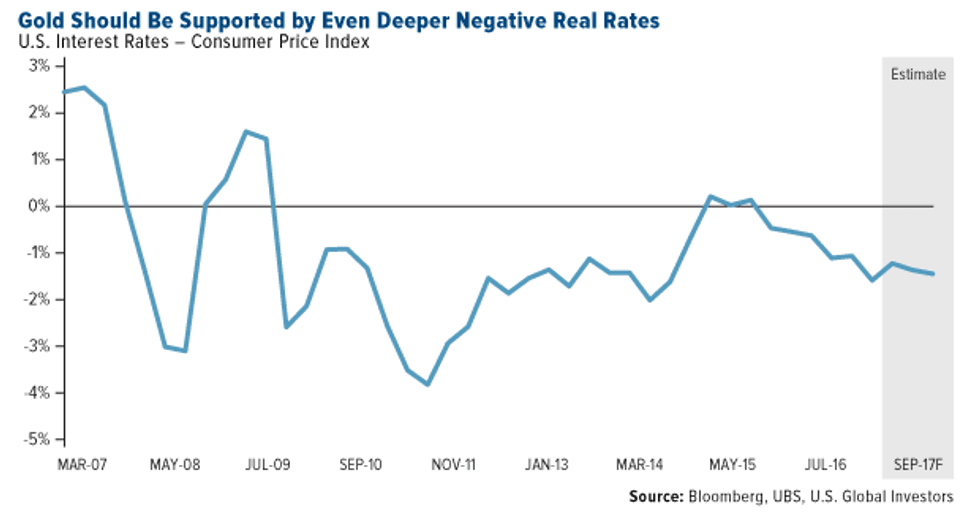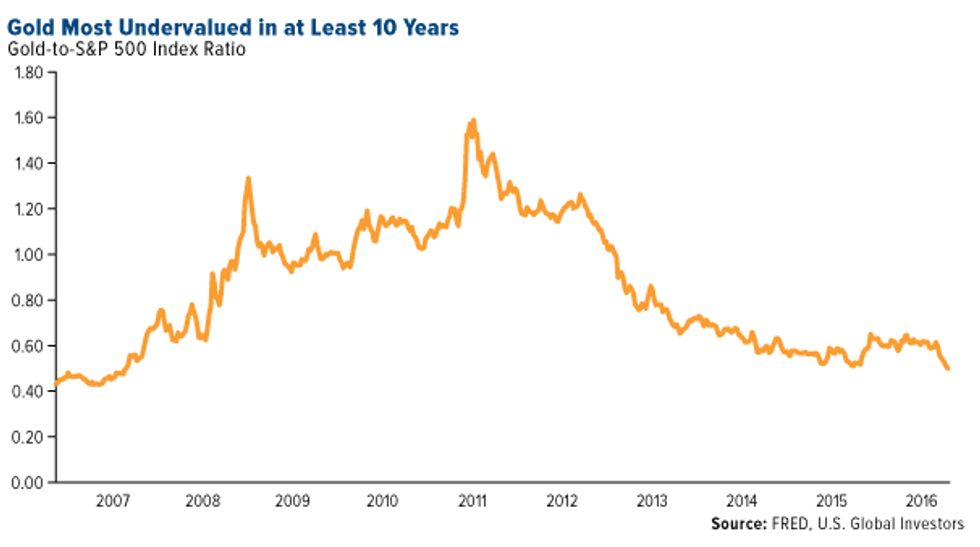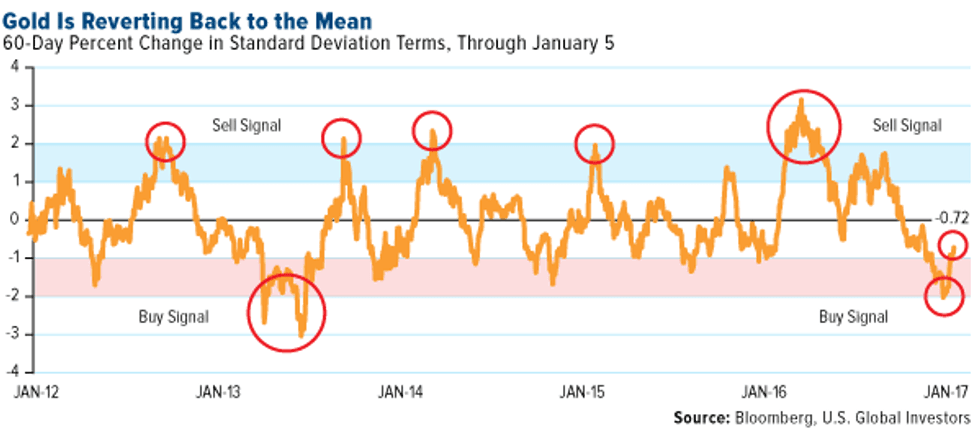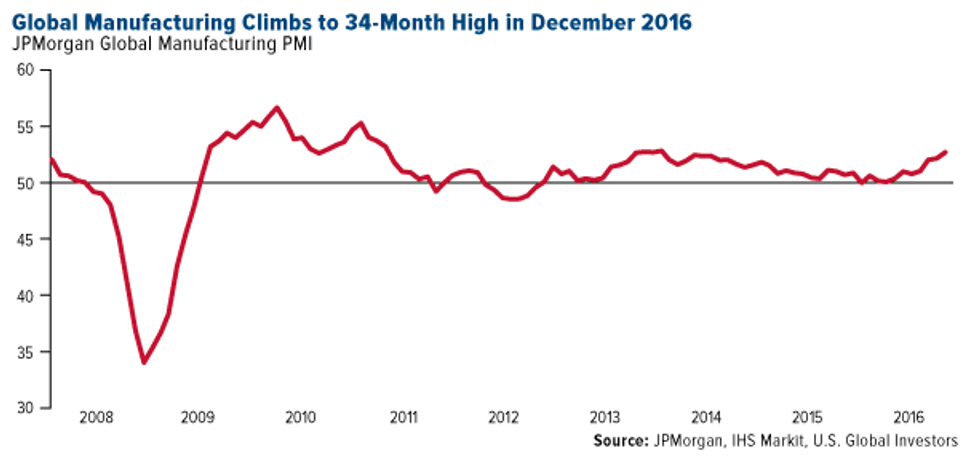Ringing in the New Year with a Bullish Case for Gold
Frank Holmes gives his thoughts on the gold market for 2017, noting the precious metal should be supported by even deeper negative real rates this year. Read on for more of what Holmes had to say.
By Frank Holmes
You could say gold miners struck gold in 2016. The group, as measured by the NYSE Arca Gold Miners Index, finished the year up an amazing 55 percent, handily beating all other asset classes shown below.
Miners were followed by commodities at 25 percent and silver at 15 percent. Gold finished up 8.6 percent, its first positive year since 2012, when it gained 7.1 percent. (Keep your eyes peeled for our forthcoming annual periodic table of commodity returns, one of our perennially popular pieces!)
I find it curious that many in the financial media continue to have a bias against gold, even though it generated better returns in 2016 than 10-year Treasuries and the U.S. dollar, which performed half as well. And when it was up as much as 28 percent in the summer, they still didn’t have anything positive to say, arguing it had gone up too much.
(Gold traders, on the other hand, have a much different opinion about the metal right now. A group of traders recently surveyed by Bloomberg revealed they are the most bullish on gold since the end of 2015, soon before it rallied in its best first half of the year since 1974. The traders cited geopolitical concerns, both in the U.S. and Europe, as well as stronger demand in 2017.)
The smart people realize personal politics must be put aside. Despite supporting Hillary Clinton during the primaries, Warren Buffett now says he is behind the president-elect—because he knows that if the U.S. does well, he does well too. Despite campaigning hard against Trump, President Barack Obama says now we should all be rooting for Trump, regardless of our politics.
Negative Real Rates Should Drive Gold Prices
But back to gold. Coming up on January 28, we have the Chinese New Year, when demand for the yellow metal historically has risen, along with prices. This will be the year of the fire rooster, one of whose lucky colors is gold.
Throughout 2017, the precious metal should be supported by even deeper negative real rates, which could fall to their lowest level in two years as inflation outpaces nominal interest rate increases, according to UBS. In October, Federal Reserve Chair Janet Yellen suggested there might be some benefit in allowing inflation to exceed the central bank’s target rate of 2 percent before another hike is considered, which is good news for gold. Numerous times in the past I’ve shown that the yellow metal has tended to rise when real rates—what you get when you subtract inflation from the federal funds rate—fell into negative territory.
“Federal Reserve interest rate hikes could weigh on gold prices in the near term,” according to UBS’s house view. “But as real rates fall more deeply into negative territory through the next year, we expect prices to rise toward $1,350 an ounce.”
Gold Extremely Undervalued
Since Election Day, domestic stocks have rallied 6.5 percent while gold has dropped as much as 7.6 percent. What this means is gold is looking extremely undervalued compared to the S&P 500, which should appeal to value investors.
Look at the gold-to-S&P 500 ratio below. The lower the ratio, the more undervalued the metal is compared to blue-chip stocks. In fact, gold is at its most undervalued in at least 10 years right now.
Technically, gold still appears oversold, down almost one standard deviation now. As you can see, it’s moving back to its mean for the 60-day period, but there’s still time to capture potential growth.
Explore investment opportunities in gold!
Commodities Show Resilience Despite Strengthening U.S. Dollar
Commodities were the second-best asset class last year because manufacturers and trade are showing improvement.
Global manufacturing expanded for the fourth straight month in December, reaching 52.7, its highest reading since February 2014. The individual U.S., Germany, Japan, and eurozone PMIs all hit their highest posts in at least a year, building on a strengthening uptrend that’s been in place since September. International trade volume expansion hit a 27-month high, according to Markit. And despite the “negative” consequence of Brexit, the U.K. Manufacturing PMI posted an amazing 56.1, up from 53.4 in November.
As for commodities, I’m pleased they’ve shown resilience in the face of a strengthening U.S. dollar. CLSA analyst Christopher Wood touched on this very topic in his recent edition of “GREED and fear,” writing that “the renewed dollar strength post Trump’s victory has not been accompanied by renewed commodity weakness. Rather the reverse has happened, with copper rallying, for example, on presumed hopes of increased demand triggered by Trump’s infrastructure policies.”
China’s commodities trading volume has also been impressive, maintaining its rank as the world’s heaviest for the seventh consecutive year.
Of course, price appreciation for commodities and natural resources is inflationary for consumer goods. Because of possibly rising gasoline prices, U.S. drivers are expected to spend about $52 billion more at the gas pump this year compared to 2016, according to GasBuddy’s 2017 Fuel Price Outlook. Three-dollar gas will likely become a reality again in several large cities, including New York, Los Angeles, Chicago and Seattle.
Whatever you end up paying, make it a point this year to stay optimistic. Not only does being optimistic help you stay healthy, both mentally and physically, but it also allows you to see the opportunities that others might not.
Explore investment opportunities in commodities and natural resources!
About the Contributor:
Frank Holmes is the CEO and chief investment officer of U.S. Global Investors. Mr. Holmes purchased a controlling interest in U.S. Global Investors in 1989 and became the firm’s chief investment officer in 1999.
The NYSE Arca Gold Miners Index is a modified market capitalization weighted index comprised of publicly traded companies involved primarily in the mining for gold and silver. The S&P 500 Stock Index is a widely recognized capitalization-weighted index of 500 common stock prices in U.S. companies. The Dow Jones Commodity Index is a broad measure of the commodity futures market that emphasizes diversification and liquidity through a simple, straightforward, equal-weighted approach. The MSCI Emerging Markets Index is an index created by Morgan Stanley Capital International (MSCI) designed to measure equity market performance in global emerging markets. It is a float-adjusted market capitalization index that consists of indices in 23 emerging economies: Brazil, Chile, China, Colombia, Czech Republic, Egypt, Greece, Hungary, India, Indonesia, Korea, Malaysia, Mexico, Peru, Philippines, Poland, Qatar, Russia, South Africa, Taiwan, Thailand, Turkey and the United Arab Emirates.
Standard deviation is a measure of the dispersion of a set of data from its mean. The more spread apart the data, the higher the deviation. Standard deviation is also known as historical volatility.
The J.P. Morgan Global Purchasing Manager’s Index is an indicator of the economic health of the global manufacturing sector. The PMI index is based on five major indicators: new orders, inventory levels, production, supplier deliveries and the employment environment.
All opinions expressed and data provided are subject to change without notice. Some of these opinions may not be appropriate to every invest. Some links above may be directed to third-party websites. U.S. Global Investors does not endorse all information supplied by these websites and is not responsible for their content.
U.S. Global Investors, Inc. is an investment adviser registered with the Securities and Exchange Commission (“SEC”). This does not mean that we are sponsored, recommended, or approved by the SEC, or that our abilities or qualifications in any respect have been passed upon by the SEC or any officer of the SEC.
This commentary should not be considered a solicitation or offering of any investment product.
Certain materials in this commentary may contain dated information. The information provided was current at the time of publication.
